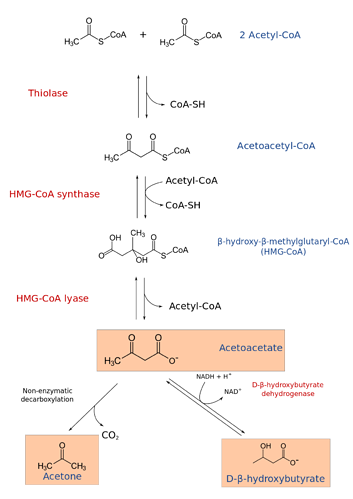Lots of us here have purchased and used (at least for a while) various acetone breath meters and discussed our experiences and experiments. So welcome to the club. Of course, the manufacturers of breath meters want to convince you that measuring acetone is the ‘Holy Grail’ and lots of us would like to think it is. However, reality intrudes…
In the following discussion please refer to the diagram below.
Acetoacetate is the fundamental ketone. It’s the energy molecule. Whenever ketones are utilized they are utilized/oxidized as acetoacetate. The big problem is that acetoacetate is not stable so whatever acetoacetate is not utilized/oxidized within a very short time - minutes? - does one of two things: it either (1) spontaneously breaks down into a molecule of acetone and a molecule of CO2 or (2) spontaneously transforms into a molecule of β-hydroxybutyrate which is its stable form and which can last for hours. For this discussion we’ll address the issue of what acetone indicates about one’s ‘state of ketosis’.
First, let’s put a myth to rest. Acetone is not a good indicator how much ketones and/or fat your metabolism is burning. Look at the diagram: acetone is a product of acetoacetate breakdown not oxidation. Yes, there is a relationship between the amount of acetone and the amount of acetoacetate but it tells us nothing about how much acetoacetate is oxidized and nothing about how much fatty acids are being oxidized. Only some acetoacetate breaks down into acetone and CO2 while most converts into β-hydroxybutyrate. We have no way to measure how much of each process occurs and measuring acetone in exhaled breath tells us nothing about it. A breath meter only tells us how much acetone got exhaled. We can deduce from that how much acetoacetate disintegrated uselessly into acetone. But we can deduce nothing about how much acetoacetate was oxidized or converted into β-hydroxybutyrate.
So what can breath acetone (BRACE) tell us for sure? Not much. For example, if you blow a high ppm of BRACE does that mean you’ve got ‘high ketones’? Not necessarily. It might indicate you just exhaled a lot of useless acetoacetate waste and utilized very little. It might also indicate you’ve consumed ethanol and not necessarily just from drinking it, generated isopropanol, or consumed some other food that broke down into one or the other or both.
If you blow a low ppm of BRACE does that mean you’ve got ‘low ketones’. Not necessarily. It might indicate that most of the acetoacetate either got used fairly quickly or converted into β-hydroxybutyrate before it had time to break down.
So what I’m getting at is this. Have fun with your breathalyzer, record and graph your data, look for repeating patterns and try to match with eating, sleeping, exercise, etc. But don’t get too excited by all of it. You’re measuring a moving target and seeing momentary points that don’t really indicate all that much that matters. Things are a lot more complicated.


 I think I have a pretty high level of metabolic flexibility and can switch between fuel sources pretty well.
I think I have a pretty high level of metabolic flexibility and can switch between fuel sources pretty well.

